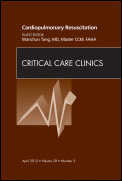
CRITICAL CARE CLINICS
Scope & Guideline
Empowering Research to Enhance Patient Outcomes
Introduction
Aims and Scopes
- Health Disparities and Social Determinants:
The journal emphasizes the examination of health disparities related to race, ethnicity, gender, and socioeconomic status, particularly in the context of critical illness. It explores how these factors influence access to care and treatment outcomes. - Innovative Critical Care Practices:
There is a strong focus on innovative practices in critical care, such as telecritical care, early warning systems, and advanced monitoring techniques, aimed at improving the delivery of care and patient safety. - Artificial Intelligence and Data Science:
The journal explores the integration of artificial intelligence and data science in critical care, assessing their roles in predictive modeling, clinical decision-making, and enhancing patient management. - Comprehensive Management of Acute Conditions:
Critical Care Clinics covers a wide range of acute conditions, including respiratory failure, sepsis, and cardiac emergencies, providing insights into their diagnosis, management, and the latest therapeutic strategies. - Interdisciplinary Collaboration:
The journal highlights the importance of interdisciplinary collaboration in critical care settings, integrating perspectives from various healthcare professionals to enhance patient care.
Trending and Emerging
- Health Equity and Social Justice in Critical Care:
There is a rising trend in addressing health equity and social justice, with a focus on disparities in care among different demographic groups. This theme is increasingly relevant as healthcare systems strive for inclusivity and improved patient outcomes. - Integration of Technology in Critical Care:
Emerging themes include the integration of technology such as telemedicine and advanced monitoring systems, which are becoming crucial in delivering care in both hospital and prehospital settings. - Artificial Intelligence and Machine Learning Applications:
The application of AI and machine learning in critical care is gaining momentum, with research exploring their potential to enhance clinical decision-making and patient monitoring. - Palliative Care and Ethical Considerations:
There is an increasing focus on palliative care and ethical considerations in managing critically ill patients, especially in complex cases involving end-of-life decisions. - Resilience and Recovery in Critical Care:
Research is emerging around the concepts of resilience and recovery, particularly in how critically ill patients can regain function and quality of life after intensive care.
Declining or Waning
- Traditional Mechanical Ventilation Techniques:
There has been a noticeable decrease in the publication of papers solely focused on traditional mechanical ventilation techniques. This may reflect a shift towards more innovative approaches and technologies in respiratory management. - Basic Pharmacologic Treatments:
Papers concentrating on standard pharmacologic treatments for critical conditions are less frequent, indicating a potential transition towards more complex and tailored therapeutic strategies. - Historical Perspectives on Critical Care:
Research focused on historical perspectives or traditional practices in critical care has diminished, suggesting a growing interest in contemporary issues and future directions rather than retrospective analyses. - General Critical Care Protocols:
There is a decline in articles discussing generic critical care protocols, possibly due to the increasing focus on personalized medicine and patient-centered approaches that consider individual patient needs.
Similar Journals
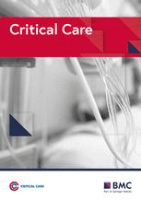
CRITICAL CARE
Connecting researchers for impactful healthcare solutions.CRITICAL CARE is an esteemed peer-reviewed journal dedicated to advancing the field of critical care and intensive medicine, published by BMC. Since its inception in 1998, it has been a prominent open-access platform that allows for the dissemination of high-quality research, fostering collaboration among researchers, healthcare professionals, and students globally. With a notable impact factor and ranking in the top quartile (Q1) of critical care and intensive care medicine, CRITICAL CARE occupies a vital role in disseminating cutting-edge findings and innovative practices that can significantly enhance patient outcomes in critical care settings. The journal not only encourages submissions of original research, clinical trials, and reviews but also emphasizes the importance of interdisciplinary approaches to critical care management. Positioned in the United Kingdom, CRITICAL CARE's commitment to open access ensures that its valuable content is readily available to a worldwide audience, reflecting its mission to bridge knowledge gaps and empower professionals in the pursuit of excellence in critical healthcare.
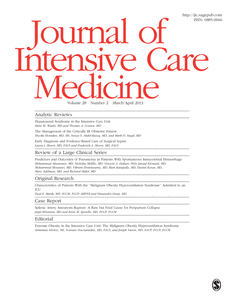
JOURNAL OF INTENSIVE CARE MEDICINE
Shaping the Future of Critical CareJOURNAL OF INTENSIVE CARE MEDICINE, published by SAGE PUBLICATIONS INC, is a leading peer-reviewed journal dedicated to advancing the field of critical care and intensive medicine. With an ISSN of 0885-0666 and an E-ISSN of 1525-1489, this esteemed journal showcases innovative research, clinical practices, and synthesis of knowledge that informs the complexities of patient care in intensive settings. Recognized for its exceptional impact, it holds a prestigious Q1 ranking in the Critical Care and Intensive Care Medicine category, landing in the upper 15% of its field according to Scopus rankings. Celebrating over three decades of publication since its inception in 1986, the journal serves both as a resource for seasoned professionals and a platform for emerging researchers eager to contribute to evidence-based practice. Although not open access, the journal ensures that critical insights and advancements are accessible to a broad audience, fostering a collaborative environment that is essential for the evolution of intensive care protocols and the enhancement of patient outcomes. With its commitment to excellence, the JOURNAL OF INTENSIVE CARE MEDICINE stands out as an invaluable resource that continues to shape the future of healthcare in critical domains.

Canadian Journal of Respiratory Critical Care and Sleep Medicine
Transforming critical care through rigorous research.Welcome to the Canadian Journal of Respiratory Critical Care and Sleep Medicine, a prestigious peer-reviewed journal published by Taylor & Francis Inc. With an ISSN of 2474-5332 and an E-ISSN of 2474-5340, this journal serves as a vital platform for disseminating cutting-edge research in the fields of critical care, intensive care medicine, and pulmonary and respiratory medicine. Since its inception in 2017, the journal has established itself within the academic community, currently holding a Q2 ranking in Critical Care and Intensive Care Medicine and a Q3 ranking in Pulmonary and Respiratory Medicine for 2023. Although it operates under a standard access model, the journal remains committed to providing valuable insights and advancing knowledge through rigorous research articles, reviews, and case studies. Positioned in the heart of the United States, the journal aims to foster collaboration and innovation among healthcare professionals, researchers, and students dedicated to enhancing respiratory care and critical treatment protocols. Join us in exploring the dynamic intersection of research and practice that defines our mission.

Cardiovascular Digital Health Journal
Advancing Cardiovascular Medicine with Cutting-Edge TechnologyCardiovascular Digital Health Journal is a premier publication dedicated to advancing the field of digital health technologies in cardiovascular care. Published by Elsevier, this journal is a vital resource for researchers, professionals, and students engaged in the exciting intersection of cardiovascular medicine and innovative digital solutions. With an ISSN of 2666-6936, the journal spans from 2020 to 2024 and is categorized in Q2 across prominent fields including Biomedical Engineering, Cardiology and Cardiovascular Medicine, and Critical Care and Intensive Care Medicine, reflecting its influential position in the academic community. Although currently not an open-access journal, it offers access through institutional subscriptions, enabling a broad reach for cutting-edge research. The Cardiovascular Digital Health Journal not only strives to disseminate high-quality studies but also aims to foster collaborative insights that propel the integration of digital health in cardiovascular practice, addressing the critical needs of health systems worldwide.
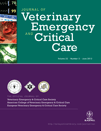
JOURNAL OF VETERINARY EMERGENCY AND CRITICAL CARE
Advancing veterinary care in critical moments.JOURNAL OF VETERINARY EMERGENCY AND CRITICAL CARE, published by WILEY, is a leading journal in the field of veterinary science, specifically focusing on emergency medicine and critical care for animals. With an impact factor that underscores its significance in the field, this journal serves as a crucial resource for veterinary professionals, researchers, and students dedicated to advancing the care of animals in critical conditions. Since its inception in 1991, the journal has continually contributed to the knowledge base and methodological advancements in veterinary emergency practices, consistently ranking in the Q1 category for veterinary sciences, as per the latest Scopus Ranks. Located in the United Kingdom, the journal is committed to disseminating high-quality, peer-reviewed research that addresses the challenges and innovations in veterinary critical care. With its goal to enhance clinical outcomes through evidence-based practices, the JOURNAL OF VETERINARY EMERGENCY AND CRITICAL CARE remains an essential platform for scholarly communication and collaboration in veterinary medicine.
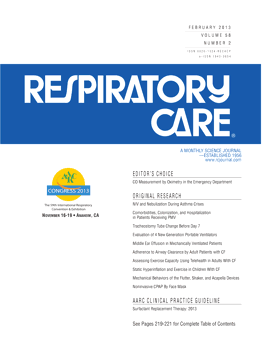
Respiratory Care
Innovating Insights for Enhanced Patient Outcomes.Respiratory Care is a leading journal in the fields of Critical Care, Intensive Care Medicine, and Pulmonary and Respiratory Medicine, published by DAEDALUS ENTERPRISES INC. With a history dating back to 1973 and continuing through 2024, this journal serves as a vital platform for disseminating innovative research findings, clinical practices, and advancements in respiratory healthcare. The journal is recognized for its impact, reflected in its impressive Q2 quartile rankings across several categories in 2023, demonstrating its relevance and influence in the medical community. Although it is not an Open Access publication, it provides critical insights and foster discussions aimed at enhancing patient care and treatment protocols for respiratory diseases. The journal is indexed in notable databases, ensuring wide visibility and accessibility of its content to researchers, professionals, and students dedicated to advancing knowledge and practice in respiratory care.

Journal of Intensive Care
Championing Open Access for Global Medical AdvancementsThe Journal of Intensive Care, published by BMC, is a leading open access journal dedicated to advancing research and knowledge in the fields of critical care and intensive care medicine. With an impressive 2023 rank of #11 out of 110 in its category and placing in the 90th percentile, this journal offers a vital platform for researchers, clinicians, and healthcare professionals to disseminate innovative findings and best practices. Launched in 2013, the journal has gained significant recognition, achieving a Q1 quartile ranking in critical care, reflecting its commitment to high-quality contributions that address pressing issues in patient management and care. Additionally, as an open access publication, the journal ensures that its content is widely accessible, fostering collaboration and knowledge sharing within the global medical community. For those engaged in intensive care, the Journal of Intensive Care is an essential resource for staying abreast of the latest research trends and clinical advancements.

ANASTHESIOLOGIE & INTENSIVMEDIZIN
Advancing Anesthesia and Intensive Care KnowledgeANASTHESIOLOGIE & INTENSIVMEDIZIN is a peer-reviewed journal dedicated to the fields of anesthesiology, critical care, and intensive medicine. Published by AKTIV DRUCK & VERLAG GMBH in Germany, this journal has been an essential resource in the medical community since its inception in 1978. With a current impact factor placing it in the Q3 quartile in both anesthesiology and critical care categories, it serves as a platform for disseminating cutting-edge research and innovative practices. The journal invites contributions that enhance the understanding of pain management, perioperative care, and intensive treatment methodologies. Although not open access, it remains committed to advancing knowledge and improving patient outcomes. With a strong focus on practical applications, ANASTHESIOLOGIE & INTENSIVMEDIZIN is invaluable for researchers, clinical practitioners, and students seeking to deepen their expertise in these crucial areas of healthcare.

PERFUSION-UK
Bridging Theory and Application in Perfusion SciencePERFUSION-UK is a distinguished academic journal published by SAGE Publications Ltd, focusing on advanced topics in the fields of nursing, cardiology, and radiology, among others. With an ISSN of 0267-6591 and an E-ISSN of 1477-111X, this journal serves as a crucial platform for disseminating vital research and innovative practices in both theoretical and applied aspects of perfusion science. Operating from the United Kingdom, it has an impressive history, converging years from 1986 to 2024. In the 2023 category quartiles, it has secured a Q2 ranking in Advanced and Specialized Nursing, revealing its strong reputation in the nursing community, while also ranking Q3 in cardiology and other medical specialties, which highlights its multidisciplinary significance. With a commendable Scopus ranking positioning it favorably among its peers, PERFUSION-UK is committed to providing researchers, professionals, and students access to cutting-edge studies and practices, ultimately aiming to enhance patient care and safety in clinical settings.
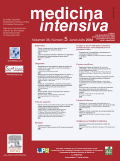
Medicina Intensiva
Empowering Healthcare Professionals with Cutting-edge ResearchMedicina Intensiva is a distinguished journal published by Elsevier España SLU, specializing in the critical care and intensive medicine fields. Since its inception in 1988, this peer-reviewed journal has established itself as a vital resource for healthcare professionals and researchers dedicated to advancing the knowledge and treatment of critically ill patients. With an impact factor ranked in the Q2 category for Critical Care and Intensive Care Medicine, the journal sits at the 50th percentile among its peers, reflecting its reputable standing in the academic community. The scope of the journal encompasses a wide array of topics, from clinical practices to innovative research findings, contributing significantly to the enhancement of patient care in intensive settings. Although the journal does not currently offer Open Access options, its valuable content is accessible to subscribers and institutions, reinforcing its role as an important conduit for disseminating high-quality research. As we continue into 2024, *Medicina Intensiva* remains committed to supporting the medical community through insightful articles and timely reviews that shape the future of intensive care.